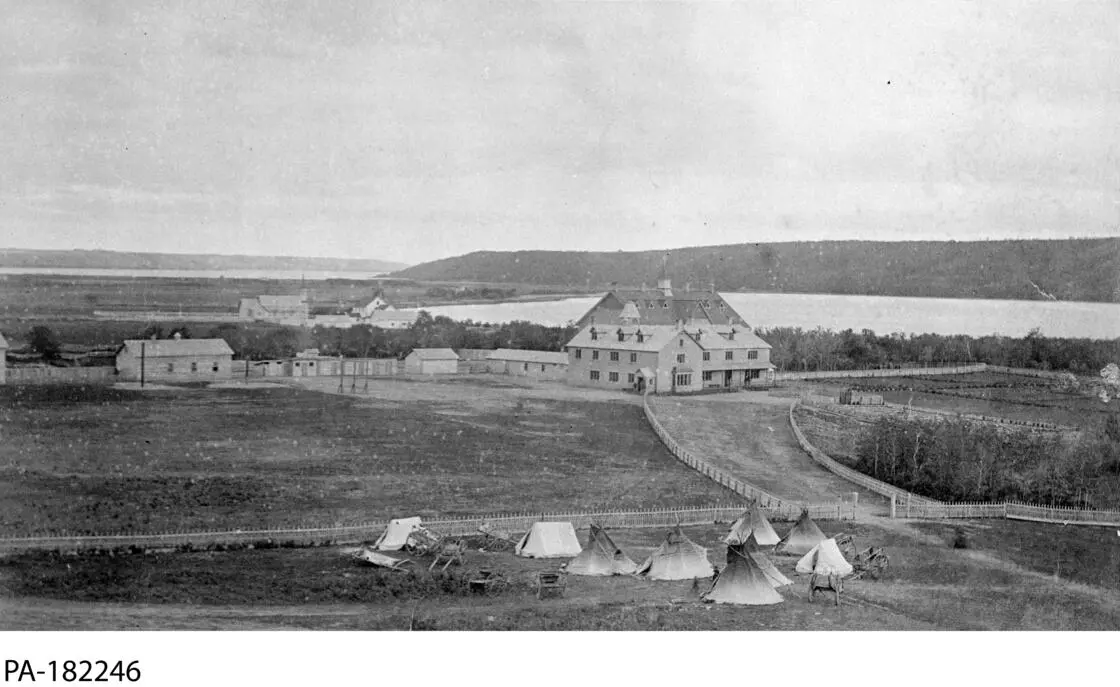Marking Orange Shirt Day and National Day for Truth and Reconciliation 2024

For the children taken. For the parents left behind.
In the beginning
The Indian Residential School system's early origins in what is currently called Canada were founded in the implementation of the mission system in the 1600s. European settlers and their churches assumed that their civilization was the standard, and they felt a need to "civilize" local Indigenous peoples.
Along with other federal assimilation policies, the government established Residential Schools across Canada in the 1880s. (Before then, Indigenous children attended a form of day school that permitted them to return home. The government did not see assimilation occurring fast enough, so they introduced aggressive assimilation to completely remove the parental influence by having attendance and enrolment exclusively at overnight schools.) Children were forcibly taken to so-called schools far from their homes as part of the strategy to alienate them from their families, culture, and communities.
In 1920, the Indian Act made it mandatory for every Indigenous child to attend a Residential School. Attending any other educational institution was illegal.
The Indian Residential School (IRS) system

Qu'Appelle Indian Residential School, Saskatchewan ca. 1885
The goal of Indian Residential Schools was to assimilate Indigenous children into this new Canadian society. The federal government financed and operated these so-called schools in partnership with the Anglican, Catholic, Methodist, and Presbyterian churches.
Indian Residential Schools operated in every province except Prince Edward Island, New Brunswick, and Newfoundland. An estimated 150,000 children were taken and forced to attend these brutal institutions, where cruelty was rampant, including physical, emotional, and sexual abuse and medical experiments on hungry children. These experiments were directly tied to the creation of the Canada Food Guide.
There was resistance toward the IRS system. Children attempted to run away, and some set fire to their schools. Parents hid their children from the Indian Agents and Royal Canadian Mounted Police (RCMP) officers who came to take them. At the Qu’Appelle school in Saskatchewan, parents set up camp within sight of the front gates, as removing their children was forbidden by law. Medical Inspector Dr. Peter Henderson Bryce tried to report the unsafe conditions in the schools that were leading to exorbitantly high death rates, but his work was silenced. He published his re-released report in 1921 titled A National Crime.
The last Indian Residential School closed in Regina, Saskatchewan, in 1996.
Today
From 2008 until 2015, the Truth and Reconciliation Commission of Canada (organized by the parties of the IRS Settlement Agreement) interviewed more than 6,500 IRS system witnesses and documented their truths. Their mandate was to inform us about what happened there.
The resulting 94 Calls to Action are a roadmap for all Canadians to repair the harms of the past and to positively move forward together. Government progress to act on the calls has been slow, while the traumatic impacts of the brutal system are long-lasting and continue today.
Today's leaders in resistance
Indigenous people continue resistance to these ongoing legacies of colonialism and the Residential School system in many ways:
- Dr. Cindy Blackstock (Gitxsan scholar) advocates for Indigenous children and families, often challenging the federal government in court with the First Nations Child and Family Caring Society of Canada.
- Alanis Obomsawin (Abenaki film director) chronicles stories of Indigenous life, resistance, arts, and sports as one of the world’s most acclaimed Indigenous directors.
- Eddy Robinson (Anishinaabe/Mushegowuk public speaker, artist, and educator) shares his journey to understand the legacy of his father’s experience at Residential School, helping others see that generational healing is possible.
- Phyllis Webstad (Northern Secqpemc advocate) is the founder of the Orange Shirt Society. She travels from coast to coast, telling her story to raise awareness about the lasting impacts of the IRS system. We honour her story and are grateful to her for her endless work.
YMCA's reconciliation efforts
September 30 has been Orange Shirt Day since 2013, and it became the National Day of Truth and Reconciliation in 2021 with the passing of Bill C-5. Every September 30 — and beyond — we honour and remember the Indigenous children who were forced into the IRS system.
The YMCA of Greater Toronto is committed to taking an anti-colonial approach to reconciliation as outlined in our Diversity, Equity, Inclusion, and Belonging strategy. We continue to follow the guidance of our Indigenous colleagues and community partners. We will mark Orange Shirt Day 2024 by amplifying Indigenous voices and events. We’ve included some below.
Please join us as we continue to listen, learn, reflect, and act individually and as a charity to deepen our understanding of our shared histories, our obligations as treaty people, and what actions non-Indigenous folks can take toward reconciliation.
Resources
Some of these resources contain disturbing content. The Indian Residential School Survivors Society is available to survivors and their families anytime. Please call 1-800-721-0066 or 1-866-925-4419 to access the 24-7 crisis line. Additional support can be found via the First Nations and Inuit Hope for Wellness Helpline at 1-855-242-3310. First Nations, Inuit, and Metis youth can text 686868 for access to Indigenous volunteer crisis responders (via Crisis Text Line powered by Kids Help Phone), and adults can access this same service by texting 741741.
Websites and online articles
Inuit Experiences at Residential School
Métis Experiences at Residential School
Videos
Heritage Minute: Chanie Wenjak (1-minute run time)
Zero Calls to Action Completed in 2023: Truth and Reconciliation Report | Power and Politics CBC (15-minute run time)
Bring the Children Home (6-minute run time)
Podcasts
Residential Schools Podcast Series by Historica Canada
Stolen by investigative journalist Connie Walker
Telling Our Twisted Stories by Kaniehti:io Horn
Free courses
Durham College's Indigenous Histories and Reconciliation modules
University of Alberta's Indigenous Canada
RAVEN'S Home on Native Land
Orange shirts
There's an ongoing global demand for orange-coloured shirts, which limits the supply available to Indigenous companies and Indigenous artists. Because of this shortage, we encourage you to buy directly from Indigenous sources. Due to overwhelming demand, stock may be depleted, and response times may be delayed.
- The Cedar Basket | Native Canadian Centre of Toronto Gift Shop, Toronto
- Native Arts Society | Indigenous-owned art gallery, Toronto
- Old's Cool General Store | for Anishnawbe Health Toronto
- Aaniin | Online
- Red Rebel Armour | Online
- Colouring It Forward | Online
- Mystical Metis | Online and student-run
- Hope and Health | Online
- Pre&Peri | Online and at Toronto pop-up locations, including pow-wows
- Woodland Cultural Centre | Brantford shop and online
- IndigenArtsy (Pass the Feather) | Online
| 2024 Date | Event | Description | Link |
| September 10 6 pm–8 pm | In-person film screen at Toronto Reference Library, Toronto In Jesus’ Name: Shattering the Silence of St. Anne’s Residential School | Film screening, followed by a Q&A with director Susan G. Enberg and a St. Anne's Survivor, Evelyn Korkmaz. Content Warning: This program features information about Residential Schools and personal accounts of Residential School experiences. The National Indian Residential School Crisis Line (1-866-925-4419) is available 24-7 for Survivors and their families. | More information |
| September 24 6:30 pm–8 pm | In person at Ethennonnhawahstihnen’ Library, Toronto Unpacking Truths in Truth and Reconciliation | Join Dr. Ruth Green as she story tells about treaty relations and responsibilities to the lands and the people who have been caretakers of the territory known as Tkaronto since time immemorial. | More information |
| September 23 to 27 | Online National Centre for Truth and Reconciliation’s Lunch and Learns | Daily webinars on Zoom and YouTube to unlearn the myths of colonial history in Canada. Aimed at an adult audience, open to the public. Experts will present for 40–50 minutes, followed by a Q&A between the moderator and guests. | Register |
| September 27 to 30 | In person at Nathan Philips Square, Toronto Toronto Council Fire Native Cultural Centre’s Indigenous Legacy Gathering | An enlightening and educational gathering at Nathan Philips Square to honour the rich diversity of Indigenous cultures. Open to the public, for all ages | More information |
| December 5 7pm –8 pm | In person at North York Central Library Tanya Talaga: The Knowing | For generations, Indigenous People have known that their family members disappeared, many of them after being sent to residential schools, "Indian hospitals" and asylums through a coordinated system designed to destroy who the First Nations, Métis, and Inuit people are. Author Tanya Talaga retells the history of this country as only she can. | Learn more and register |
| Year-round | Online Tours of the former Mohawk Institute | These virtual tours will guide you through the former Mohawk Institute Indian Residential School, providing an overview of its 140-year history. | Find a tour date and register |

















